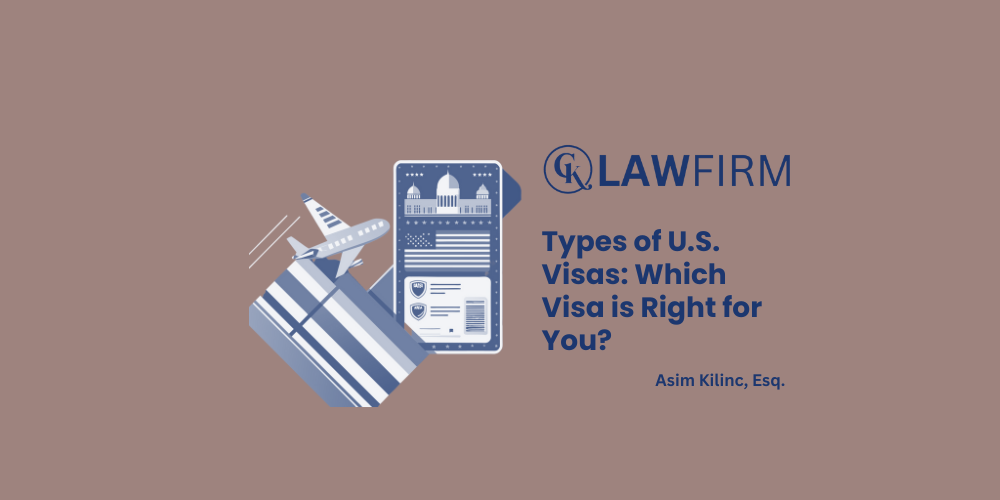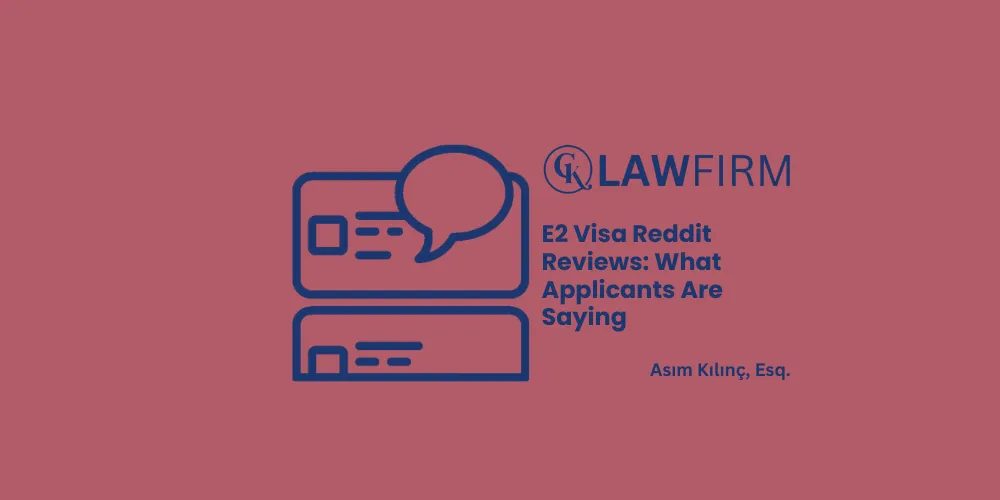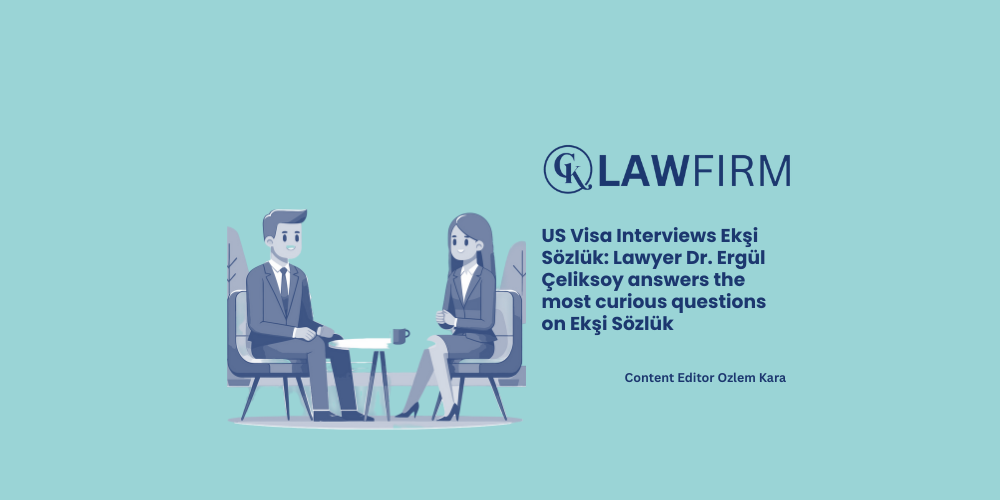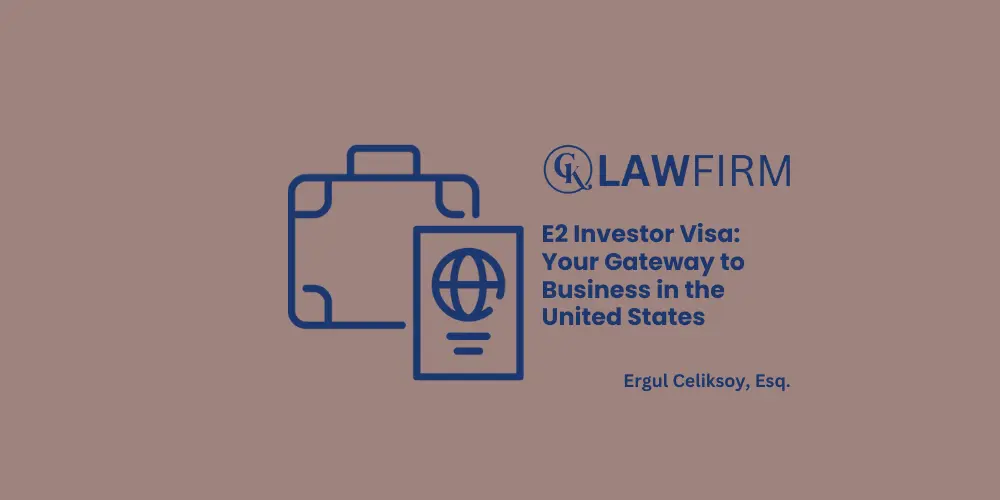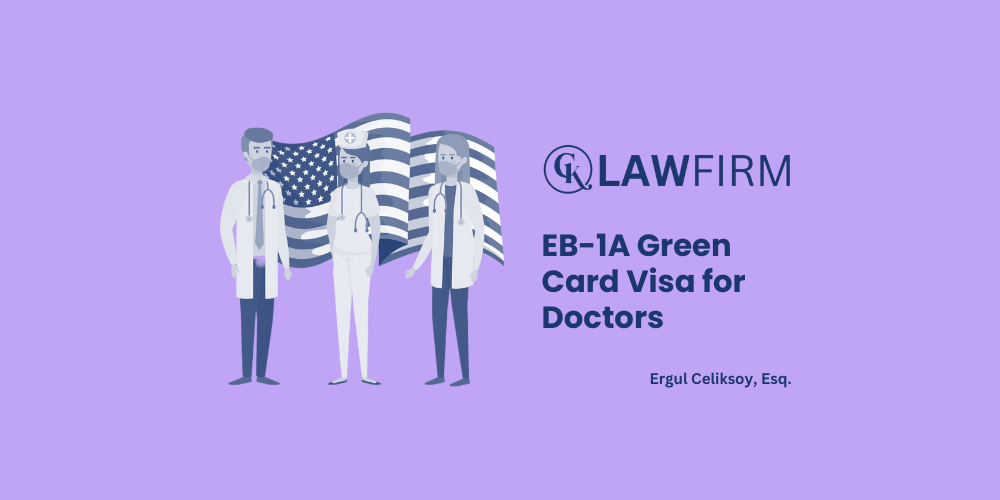Schedule an Appointment with Our Attorneys Now
By Asim Kilinc, Immigration Attorney at CK Law Firm
Selecting the right visa type is crucial for individuals planning to travel to the United States. The visa type depends on the purpose and duration of your visit. Here are the most common types of U.S. visas:
Tourist Visas (B1/B2)
- B1 Visa: Used for business travel. It is suitable for business meetings, conferences, or business negotiations. However, this visa does not permit you to work in the U.S.
- B2 Visa: Used for tourism, family or friend visits, medical treatment, or social events. With this visa, you cannot work or study in the U.S.
Work Visas (H1B, L1, O1)
- H1B Visa: A temporary work visa for specialized jobs, where the applicant has a specific job offer and is sponsored by a U.S. employer. The H1B visa allows you to stay in the U.S. for up to 3 years, with possible extensions under certain conditions.
- L1 Visa: Issued for intra-company transfers between branches of the same company in different countries. L1A is for executives and managers, while L1B is for positions requiring specialized knowledge.
- O1 Visa: Given to individuals with extraordinary abilities in the fields of science, arts, education, business, or athletics.
Student Visas (F1, M1)
- F1 Visa: Granted to students who wish to pursue full-time academic studies at accredited schools, colleges, or universities in the U.S. F1 visa holders may work on campus under specific conditions.
- M1 Visa: Applies to students wishing to enroll in vocational or technical training programs. M1 visa holders can stay in the U.S. for the duration of their academic program.
Exchange Program Visas (J1)
- J1 Visa: Issued to individuals participating in cultural exchange programs, such as students, teachers, interns, or researchers. J1 visa holders typically must return to their home country after completing their program.
Immigrant Visas (EB-5, DV)
- EB-5 Visa: A type of immigrant visa for foreign investors who wish to obtain a Green Card by investing in the U.S. and creating jobs under certain conditions.
- DV (Green Card) Lottery Visa: A visa granted through the Diversity Visa (DV) Lottery held annually by the U.S. government, allowing selected individuals to obtain a Green Card and live and work in the U.S. indefinitely.
- EB-2 National Waiver Visa: Available for those who have demonstrated significant achievements in their field and meet at least 3 of the 10 criteria set by USCIS.
- EB-1A Visa: Issued to individuals who have achieved a high level of success in the fields of science, arts, education, business, or athletics.
Fiancé and Family Visas (K1, K3)
- K1 Visa: Issued to foreign nationals engaged to a U.S. citizen. After entering the U.S. with a K1 visa, the couple must marry within 90 days.
- K3 Visa: Granted to spouses of U.S. citizens who wish to settle in the U.S. This visa allows the spouse to live in the U.S. while their Green Card application is being processed.
Choosing the right visa type is crucial for ensuring that your plans proceed smoothly. Each visa type has specific requirements and conditions. At CK Law Firm, we are happy to guide you through your U.S. visa application process. Feel free to reach out via cklawfirm.org, info@cklawfirm.org, or contact me directly on LinkedIn.
Who is Attorney Asım Kılınç?
Attorney Asım Kılınç is the co-founder of CK Law Firm and is recognized for his expertise in immigration law and U.S. asylum applications. Kılınç completed his Master’s degree at Southern Methodist University Dedman School of Law and is a member of the Missouri Bar Association, with a focus on U.S. immigration law.
Attorney Kılınç’s extensive knowledge and experience in immigration law have significantly contributed to CK Law Firm’s success in this field. He has actively participated in the preparation of over 1,000 cases, demonstrating his expertise in this area. By providing comprehensive and professional legal support to his clients, he helps them adapt to their new lives in the U.S.
Attorney Kılınç is also well-versed in U.S. asylum applications. He meticulously guides his clients through the process and ensures they receive the best legal advice. He provides top-quality service to clients in matters of citizenship, Green Card, work permits, and other immigration processes, supporting them from start to finish on their journey to U.S. citizenship.
Attorney Asım Kılınç, who solidifies CK Law Firm’s leadership in immigration law and U.S. asylum applications, offers reliable and effective legal consultancy services to clients, assisting them in building a new life in the U.S.
Asım Kılınç, Immigration Attorney, CK Law Firm
Imagine turning your dream of starting a business in the United States into reality. The E2 visa offers a unique opportunity for entrepreneurs and investors worldwide to make this dream come true. This visa type is frequently discussed on platforms like Reddit, where applicants share their experiences and insights. In this article, we will answer common questions about the E2 visa and delve into valuable perspectives from E2 Visa Reddit reviews. Here are the headings I will shed light on in this article:
- What is the E2 Executive Visa?
- How Much Money is Required for the E2 Investor Visa?
- Can You Get a Green Card with an E2 Visa?
- E2 Visa Reddit Reviews
I will provide detailed information under these headings. However, if you have any questions about these topics, you can always ask us through the comments section of the blog or through the official CK Law Firm website. You can also send me your messages via LinkedIn.
What is the E2 Executive Visa?
Are you planning to start a business or invest in an existing one in the U.S.? The E2 visa is specifically designed for this purpose. It is available to nationals of countries with which the United States maintains a treaty of commerce and navigation, and it opens doors not just for investors but also for business managers.
Who is Eligible?
- Entrepreneurs looking to start their own business.
- Investors planning to contribute to an existing enterprise.
- Managers intending to actively oversee their business operations in the U.S.
This visa also extends benefits to family members, granting spouses and children under 21 the right to live, work, and study in the U.S. Reddit users frequently praise the family-friendly structure of the E2 visa.
How Much Money is Required for the E2 Investor Visa?
The E2 Investor Visa does not have a fixed minimum investment amount, but the required sum largely depends on the business type and industry. According to discussions on Reddit, here are some key points:
- Investments are generally expected to be at least $100,000 or more.
- The investment must be active, meaning it should support the growth of a business and contribute to the U.S. economy.
A Reddit user shared this tip:
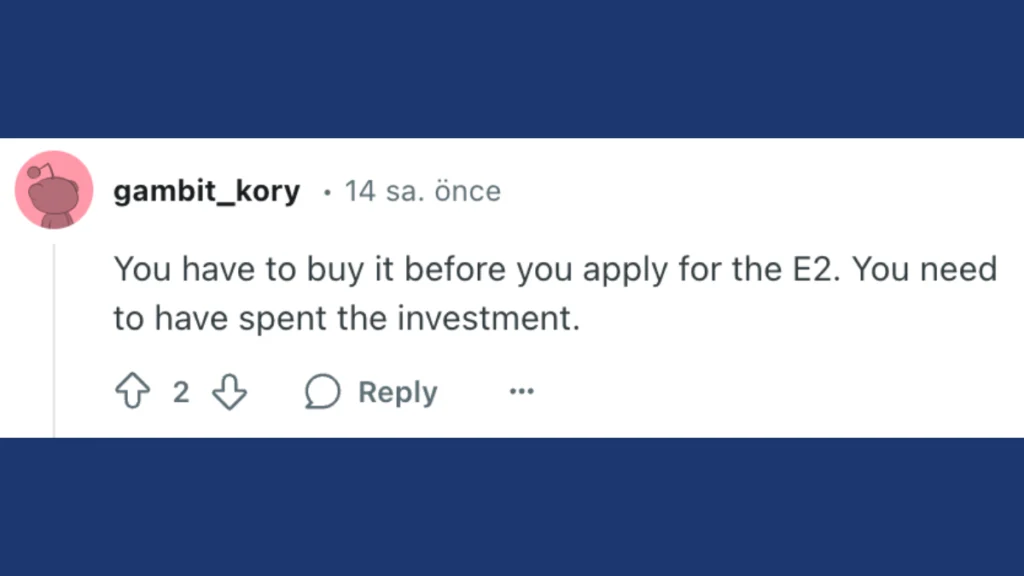
Can You Get a Green Card with an E2 Visa?
While the E2 visa does not directly lead to a Green Card, it can serve as an essential stepping stone. Here’s how:
- EB-5 Investor Visa: By increasing your investment to meet EB-5 requirements, you can transition to a Green Card.
- Change of Status: It is possible to shift to another visa type, such as H-1B or L-1, or directly apply for a Green Card.
On Reddit, one user emphasized:
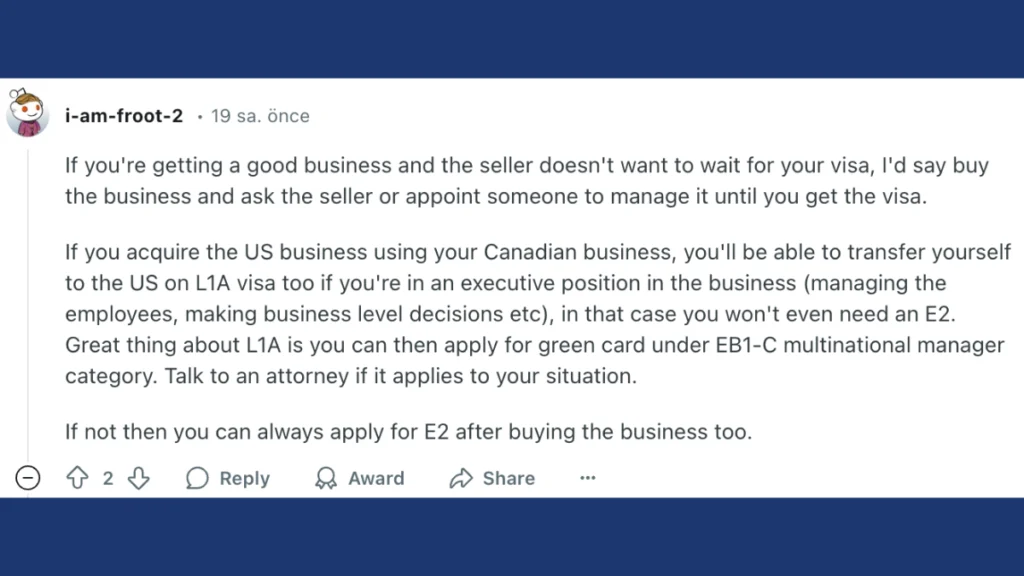
E2 Visa Reddit Reviews
Reddit is an important platform for sharing experiences and often transparent comments. For this reason, it may be more informative to examine the experiences of people who have experienced the process by examining the comments of users here. Especially by including this section in this article, I aim to provide you with more detailed information about the process. Let’s look at the comments of the users and their experiences about the process:
Application Process
Many Reddit users stress the importance of preparing a comprehensive business plan and submitting complete documentation. Ensuring that the investment aligns with the business’s size and scope is a frequently discussed topic.
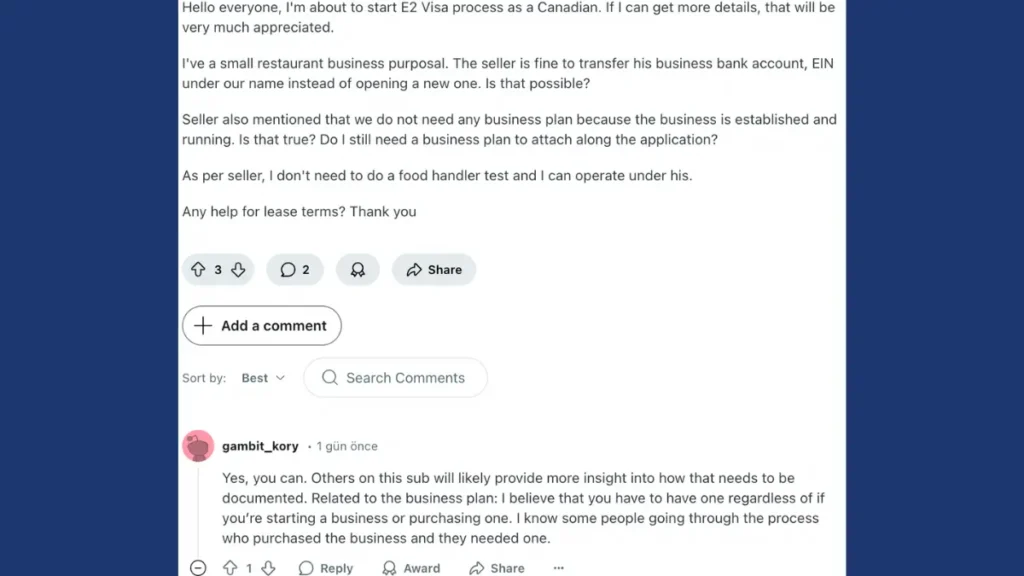
Suitable Business Models
The most common E2 visa-eligible businesses mentioned include restaurants, tech startups, and small-scale service industries. One user shared:
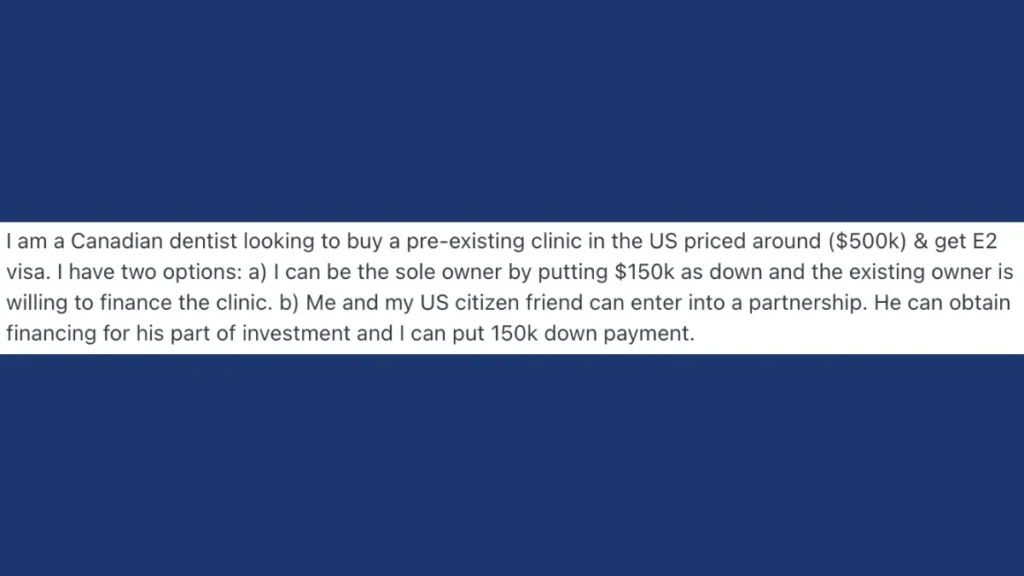
Family Benefits
Another key discussion point on Reddit is the visa’s benefits for family members:
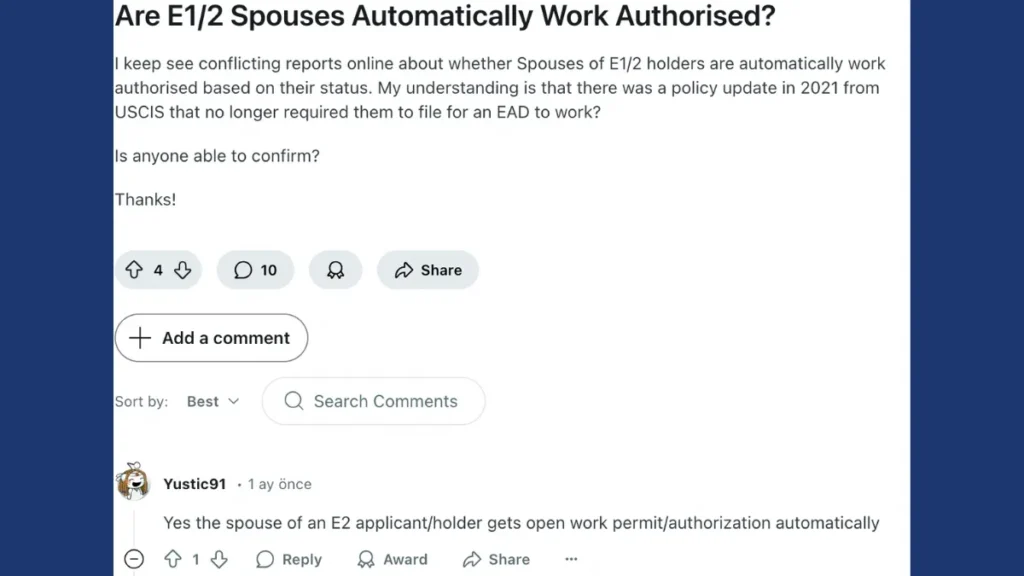
Yes, we have come to the end of this article with our Reddit review. However, you can always contact us via our website for more detailed information about the US E2 investor visa or for application planning. You can also send your messages via LinkedIn for one-to-one communication with me.
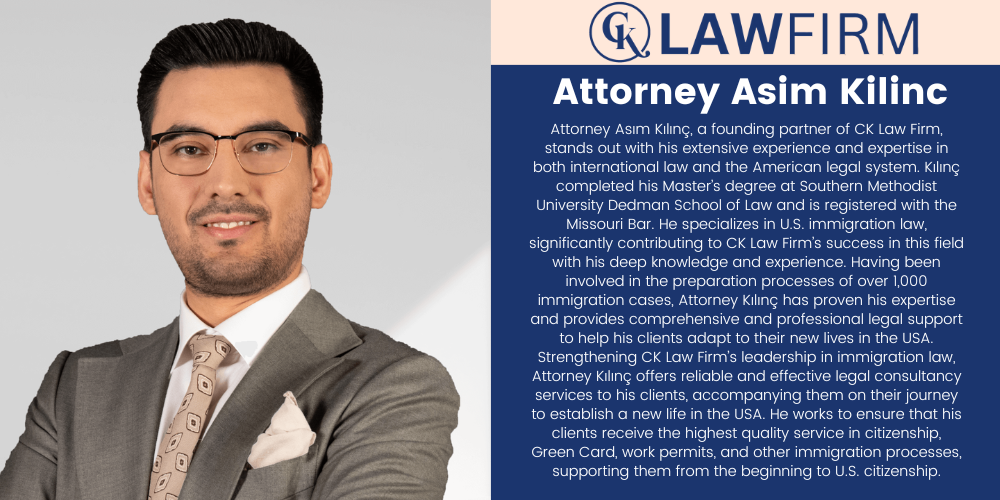
By Ozlem Kara, Content Editor at CK Law Firm
CK Law Firm’s Content Editor Özlem Kara and CK Law Firm’s Founding Partner Ergül Çeliksoy, who specializes in U.S. visa interviews, met on Ekşi Sözlük to answer the most frequently asked questions about U.S. visa interviews. We would like to thank Ergül Çeliksoy for this insightful interview.
By reading this post, you will find answers to the following questions:
- What Do Officers Pay the Most Attention to During the Interview?
- How Should You Prepare for the Interview?
- What Should You Be Mindful of During the Interview?
- What Are the Commonly Asked Questions in the Interview?
- How to Provide Effective Answers to These Questions?
- What Documents Should You Bring to the Interview?
Hello, Mr. Ergül. We would like to know more about you and your career. Could you tell us about yourself?
Certainly. I completed my master’s degree in international law and human rights law at the University of Nottingham in 2017 and then began my Ph.D. studies at the same university. In 2022, I earned my Doctor of Laws from the University of Nottingham School of Law. My publications, research, and articles have gained international recognition in my field. I have handled many cases, and now, with the experience I have gained, I am helping my clients start new lives by providing effective and solution-oriented services at CK Law Firm.
Mr. Ergül, What Do Officers Pay the Most Attention to During the Interview?
U.S. consular officers conducting visa interviews pay attention to several critical points when deciding whether to approve a visa based on the applicant’s situation and the information provided. Here are the most important factors they focus on:
Intent to Return:
- One of the most crucial factors is whether the applicant has a strong intention to return to their home country after their stay in the U.S. Officers evaluate your ties to your home country (family, job, property, education). The stronger these ties are, the less likely they believe you will remain in the U.S. permanently.
Purpose of Travel:
- You must clearly state the purpose of your travel and ensure that it aligns with the type of visa you are applying for. Officers assess whether your purpose is consistent and if you intend to stay in the U.S. legally.
Financial Situation:
- It is important to demonstrate that you can financially support your stay. Officers may review your bank statements, pay stubs, and sponsorship letters if applicable, to assess your financial independence during your stay in the U.S.
Previous Travel History:
- Your previous travels to the U.S. or other countries and the details of those travels are another factor officers consider. They will check for any past visa violations or rejections of your previous visa applications.
Answers Given During the Interview:
- It is important that your answers during the interview are clear and consistent. Any discrepancies between your answers and the information on your application form may raise suspicions.
Public Safety and Immigration Policies:
- Officers carefully review the application to assess whether the applicant poses a security risk to the U.S. and whether they may violate immigration laws. Your criminal record, past visa violations, or any security concerns will be closely scrutinized.
These factors play a critical role in the review of your visa application and are the most important aspects that the officer considers during the interview. Providing accurate and complete information during the application process, demonstrating confidence, and meticulously preparing your documents can facilitate the approval of your visa.
How Should You Prepare for the Interview?
Preparing for a U.S. visa interview is important to increase your chances of success. There are several key steps to take when preparing for the interview:
Gather the Required Documents:
- Passport, DS-160 confirmation page, visa appointment confirmation page, passport photo, financial documents, documents showing your intent to return, and documents proving your employment or education status.
Prepare Your Travel Plans:
- Create a detailed plan for your stay in the U.S. Know which cities you will visit, how long you will stay, and what you plan to do during that time.
- Prepare your accommodation and flight reservations, but ensure these reservations are not final, as you may incur losses if the visa is denied.
Practice for the Interview:
- Review potential interview questions and practice how you will answer them. You may want to ask a family member or friend to help you with this.
- Make sure your answers are short, clear, and consistent.
Learn the Rules at the Consulate:
- Familiarize yourself with the security rules at the consulate. Know that electronic devices, bags, and other items are not allowed inside.
- Bring only the necessary documents and personal belongings.
Stay Updated:
- Review the latest information on U.S. visa policies and the interview process. Visit the consulate’s website to stay informed about any updates.
By following these preparations, you can approach the interview more confidently and increase your chances of a positive outcome for your visa application.
What Should You Be Mindful of During the Interview?
There are several important points to keep in mind during the U.S. visa interview:
Be Honest and Clear:
- Answer questions honestly and clearly. Providing misleading information may result in the denial of your visa application.
Keep Your Documents Ready:
- Have all required documents readily available and be prepared to present them quickly when asked.
Dress Appropriately:
- Dressing formally and neatly can help you leave a professional impression.
- Choose an outfit that makes you feel comfortable and confident during the interview.
Arrive on Time:
- Make sure to arrive on time or even early for your interview appointment.
Make a Good Impression:
- Be polite and respectful during the interview. It is important to leave a professional and positive impression on the consular officer.
Emphasize Your Intent to Return:
- Make it clear that you only intend to visit the U.S. temporarily and that you have strong intentions to return to your home country.
What Are the Commonly Asked Questions in the Interview?
The questions commonly asked in U.S. visa interviews may vary depending on the type of visa you are applying for and your personal situation. However, the following are some general questions frequently encountered in interviews:
Travel Purpose and Plans:
- Why do you want to visit the U.S.?
- How long do you plan to stay in the U.S.?
- Which cities do you plan to visit?
Financial Situation:
- How will you finance your trip?
- Where will you stay during your time in the U.S.?
- What is your profession, and what is your monthly income?
Family and Personal Information:
- Do you have any relatives living in the U.S.?
- What is your marital status? Do you have children?
Education and Employment:
- Which school did you attend, or which university did you graduate from?
- Where do you work? What is your position?
Return Plans:
- What are your plans to return to your home country?
- What motivates you to return to your home country?
Previous Travels and Visa Status:
- Have you visited the U.S. before?
- Have you applied for visas to other countries?
In addition to these questions, you may encounter more specific questions depending on the type of visa you are applying for. When preparing for the interview, make sure your documents are complete and that you can clearly express your travel plans in the U.S.
How to Provide Effective Answers to These Questions?
Providing effective answers to questions during the U.S. visa interview can increase the likelihood of your application being successful. There are several methods and tips for effectively answering interview questions:
Provide Clear and Concise Answers:
- Example: In response to the question “Why do you want to visit the U.S.?” you could answer, “I want to take a vacation and see some tourist spots in New York.”
Give Accurate Information:
- Example: In response to the question “Have you visited the U.S. before?” you should answer, “Yes, I visited in 2019 for a tourist trip.”
Support with Documents:
- Example: In response to the question “How will you finance your trip?” you could say, “I have sufficient savings in my bank accounts,” and then present the relevant bank statements.
Be Consistent:
- Example: If you stated in your application that you will be traveling to New York, mention the same city during the interview.
Maintain a Positive Attitude:
- Example: In response to the question “How long do you plan to stay in the U.S.?” you should say, “I plan to stay for three weeks and then return to my job,” clearly stating the duration of your stay.
Explain Your Travel Purpose Well:
- Example: In response to the question “Why do you want to visit the U.S.?” you could say, “I want to attend a conference related to my profession,” and then present the relevant documents.
Express Your Intent to Return Strongly:
- Example: In response to the question “Do you plan to stay in the U.S.?” you should say, “No, I plan to return to my job and family in my home country.”
Listen Carefully to the Consular Officer’s Questions:
- Example: If you do not fully understand a question, say, “I didn’t fully understand this question, could you please repeat it?” to clarify any confusion.
These methods can help you provide effective and successful answers during the visa interview. Being prepared and answering questions calmly can lead to a positive outcome.
What Documents Should You Bring to the Interview?
The documents you need to bring to a U.S. visa interview may vary depending on the type of visa you are applying for and your personal circumstances. However, the following are some of the basic documents generally required:
Valid Passport:
- A passport that is valid for at least six months beyond your planned date of travel. It is important that your passport includes all visas from previous travels.
DS-160 Confirmation Page:
- Bring a printed copy of the DS-160 confirmation page you completed online. This page includes a barcode confirmation number, which will be requested during the interview.
Visa Appointment Confirmation:
- Bring the confirmation page of your visa appointment.
Photo:
- A passport-style photo that meets U.S. visa application standards. While the photo uploaded to the DS-160 form is usually sufficient, it’s a good idea to have an extra copy with you.
Financial Documents:
- Bank Statements: Bank statements for the last 3-6 months.
- Pay Stubs: Pay stubs for the last 3 months.
- Tax Returns: Last year’s tax returns.
- Sponsorship Letter: If you have a sponsor, provide financial documents and a sponsorship letter from your sponsor.
Educational and Employment Documents:
- Student Certificate: A current student certificate if you are a student.
- Diploma or Transcript: A diploma or transcript showing your education status.
- Employment Letter: If employed, a letter from your employer stating your position and salary.
- Leave of Absence Letter: A letter from your employer stating that you are on leave for the duration of your trip.
Travel Plan and Accommodation Information:
- Flight Reservation: Flight reservations or your flight itinerary.
- Hotel Reservation: Hotel reservations or the address and contact information of the place you will be staying.
Visa-Specific Documents:
- Tourist Visa: Documents showing your travel purpose (vacation plans, tour programs).
- Business Visa: Invitation letter, employment letter, work program, etc.
- Student Visa (F-1): Acceptance letter, I-20 form, documents from the school.
- Family Visit: Invitation letter from your relatives living in the U.S., documents showing your relationship to them.
Documents Proving Intent to Return:
- Property Documents: Deeds of property you own in your home country.
- Rental Agreement: If you live in a rented property, bring a rental agreement.
- Family Information: Documents showing your ties to your family in your home country (marriage certificate, children’s birth certificates).
Visa Fee Receipt:
- Bring the receipt showing that you have paid the visa application fee. This document indicates that your visa application process has been completed.
These documents are typically required for U.S. visa applications, but additional documents may be needed depending on the type of visa you are applying for. Ensure that your documents are complete before going to the interview and organize them in a way that makes them easily accessible.
Mr. Ergül, you have provided clarity on the questions frequently asked by Ekşi Sözlük users regarding U.S. visa interviews. To summarize, what would you like to say about visa interviews?
Visa interviews, which are one of the final steps in achieving your dream of living in America, can be nerve-wracking for many. However, by paying attention to a few key points both before and during the interview, you can achieve a successful outcome. For more information on U.S. visa types, your eligibility, document requirements, and more, visit cklawfirm.org, email us at info@cklawfirm.org, or contact me directly on LinkedIn.
By Ergul Celiksoy, Immigration Attorney at CK Law Firm
Are you ready to launch your business in the United States? The E2 Investor visa provides a unique opportunity for entrepreneurs and investors to live and work in the U.S. By contributing to the U.S. economy, you can build a successful business while enjoying the benefits of American life. Here’s a comprehensive guide to everything you need to know about the E2 visa in 2025. Let’s talk about the questions I will address in this article:
- What is the E2 Visa?
- Who Qualifies for the E2 Visa?
- How to Apply for the E2 Visa
- How Long is the E2 Visa Valid?
If you are planning to apply for an E2 visa but do not know how to apply, you can contact us on our website or in the comments section of our blog. You can also send me a message on LinkedIn for private communication.
What is the E2 Visa?
The E2 visa is a non-immigrant visa designed for nationals of treaty countries who wish to invest in and manage a business in the United States. It allows:
- Entrepreneurs to establish or expand their businesses.
- Family members, including spouses and children under 21, to accompany the investor.
- Spouses to apply for work authorization and children to attend school.
This visa is ideal for individuals looking to make a significant impact on the U.S. economy while pursuing their entrepreneurial goals. The E2 visa benefits also include flexibility and renewable status, making it a top choice for business investors.
E2 Visa vs. E1 Visa: What’s the Difference?
The E2 visa is often compared to the E1 visa, but they cater to different purposes:
- E1 Visa: Focuses on substantial trade between the treaty country and the U.S.
- E2 Visa: Requires a significant financial investment in a U.S.-based enterprise.
While the E1 visa revolves around trade, the E2 visa is tailored for active investors aiming to manage businesses directly. You can access our content from the link to access our more detailed review on E1 and E2 visa.
Who Qualifies for the E2 Visa?
To be eligible for the E2 visa, you must:
- Be a Citizen of a Treaty Country: Ensure your country has a commerce treaty with the United States.
- Make a Substantial Investment: There is no minimum amount specified, but most successful applications involve investments of at least $100,000, making it a viable E2 visa business investment.
- Have Active Business Involvement: Passive investments, like real estate purchases, do not qualify.
- Own or Control the Business: You must have at least 50% ownership or operational control over the enterprise.
- Demonstrate Economic Impact: The business should create jobs or contribute significantly to the local economy. This highlights the economic impact of E2 visa investments.
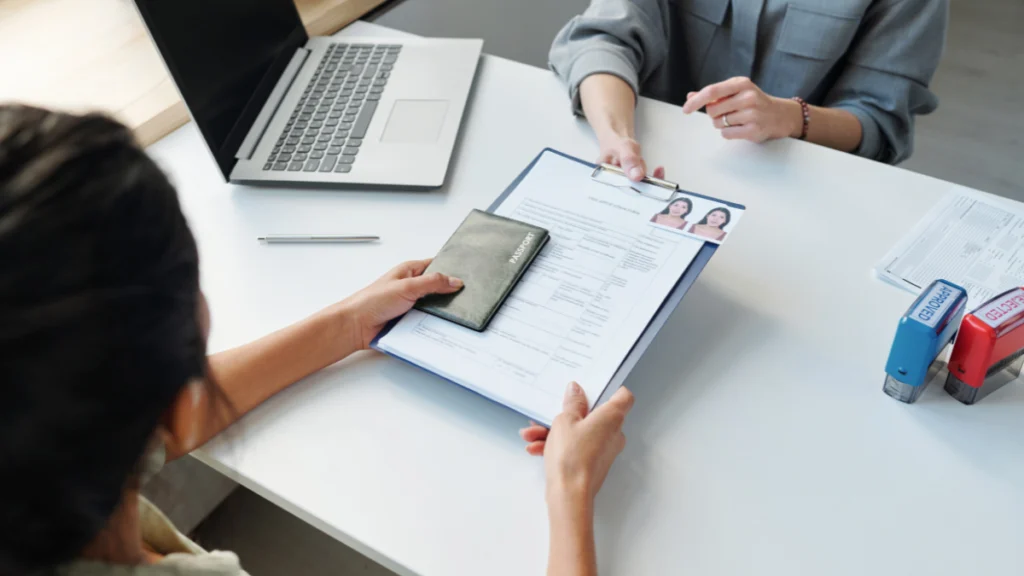
How to Apply for the E2 Visa
The E2 visa application process involves several key steps:
- Develop a Detailed Business Plan: Highlight your investment, operational strategy, and projected economic impact.
- Secure Your Investment: Funds must be at risk and irrevocably committed to the enterprise.
- Submit Your Application: File Form DS-160 and supporting documents with a U.S. consulate or embassy.
- Attend an Interview: Be prepared to discuss your investment and business plans in detail.
- Wait for Approval: Processing times vary but generally take a few weeks to months. Wondering how to get E2 visa approval? Proper preparation is key.
Is the E2 Visa Hard to Get?
Is the E2 visa hard to get? Obtaining it is straightforward with proper preparation. To improve your chances:
- Work with an immigration attorney to ensure compliance with all requirements.
- Provide comprehensive documentation, including financial records and a robust business plan.
- Highlight the economic benefits your business will bring to the U.S.
How Long is the E2 Visa Valid?
The E2 visa is typically issued for an initial period of up to two years. The good news? It’s renewable indefinitely as long as:
- Your business remains operational.
- You meet all visa requirements.
- You intend to return to your home country after your visa expires.
For some treaty countries, the visa may be issued for up to five years, with the same renewal conditions. The E2 visa renewal process ensures long-term viability for your U.S. business ventures.
Can the E2 Visa Lead to a Green Card?
The E2 Investor visa does not directly lead to a Green Card, but it can pave the way for permanent residency. Here’s how:
- EB-5 Investor Program: Transition to the EB-5 visa by increasing your investment to meet its requirements, making Green Card through E2 visa a feasible path.
- Employment-Based Sponsorship: If your business grows significantly, you may qualify for employment-based Green Cards.
While the E2 visa itself doesn’t provide a direct path to citizenship, it offers valuable opportunities for future immigration options.
Why Choose the E2 Visa?
The E2 visa is a perfect choice for:
- Entrepreneurs looking to expand their ventures to the U.S.
- Investors aiming to create economic value and job opportunities.
- Families seeking to experience life and work in America.
With its flexibility, renewability, and potential for growth, the E2 visa is your gateway to achieving entrepreneurial success in the U.S. For nationals of treaty countries E2 visa options provide a robust framework to make your business thrive.
In this article, I mentioned that the E-2 visa offers important opportunities for entrepreneurs who want to start a business or invest in a business in the U.S. However, I should also mention that in order to successfully complete this process, a detailed preparation, a meticulous business plan and an active role of the investor in the management of the business are required. You can contact us at cklawfirm.org or info@cklawfirm.org for your E2 eligibility, paperwork and much more. You can also contact me directly on LinkedIn for your specific questions.
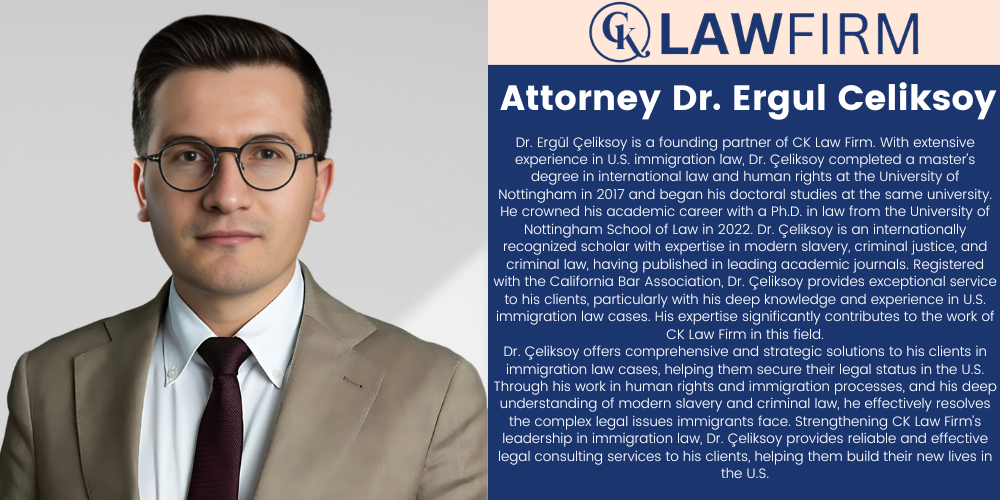
By Asim Kilinc, Immigration Attorney at CK Law Firm
Thousands of people around the world, including in our country, apply for a Green Card. In this article, we will discuss the following topics:
- What is a Green Card?
- What are the Advantages of a Green Card?
- Who Can Apply for a Green Card?
- How to Apply for a Green Card?
- Where to Apply for a Green Card?
If you have any other questions related to this topic, please don’t hesitate to reach out to me via the comment section below, send me a message directly on LinkedIn, or contact me through the CK Law Firm Immigration Law Firm website, of which I am a founding partner.
What is a Green Card?
A Green Card is an official document that grants permanent residency in the United States. Officially known as the “Permanent Resident Card,” this card allows its holder to live, work, and study in the U.S. indefinitely. Green Card holders are also eligible to apply for U.S. citizenship under certain conditions.
What are the Advantages of a Green Card?
There are numerous advantages to being a Green Card holder. Some of the primary benefits include:
- Permanent Residency and Work Rights: Green Card holders have the right to live and work in the U.S. indefinitely. They can work in any job without needing a work permit.
- Sponsoring Family Members: Green Card holders can sponsor their spouses and unmarried children under 21 to come to the U.S.
- Education and Scholarships: Green Card holders can benefit from in-state tuition rates and apply for student loans, grants, and scholarships like U.S. citizens.
- Citizenship Application: After residing in the U.S. for a certain period (usually five years), Green Card holders are eligible to apply for U.S. citizenship.
- Travel Freedom: Green Card holders face fewer restrictions when entering and leaving the U.S. However, they should be cautious about long-term travel abroad, as it could jeopardize their Green Card status.
- Property Ownership: Green Card holders have the right to own property in the U.S. and can invest in real estate.
- No Need for Visa Renewal: Unlike temporary visas, a Green Card does not require continuous renewal. It is renewed every 10 years.
These advantages highlight why the Green Card is highly sought after by many and its value for those planning to live permanently in the U.S.
Who Can Apply for a Green Card?
People eligible to apply for a Green Card can be categorized under various groups. The U.S. government offers different pathways for Green Card applications, each based on specific criteria. Some of the main groups eligible to apply for a Green Card include:
- Family Members
- Immediate Family of U.S. Citizens: U.S. citizens can sponsor their spouses, unmarried children under 21, and parents for a Green Card.
- Family Members of Green Card Holders: Green Card holders can also sponsor their spouses and unmarried children. However, the family members of U.S. citizens are given priority.
- Employer Sponsorship
- Skilled Workers: Qualified workers who are offered employment in the U.S. can apply for a Green Card. This category may include skilled workers, professionals, and unskilled workers.
- Investors: Foreign investors who make a substantial investment and create jobs in the U.S. may also obtain a Green Card.
- Diversity Visa (Green Card Lottery)
- Diversity Visa Program: Each year, a lottery is held for people from countries with low immigration rates to the U.S. Those who win the lottery are eligible to obtain a Green Card. Applications must meet the criteria set for the lottery.
- Refugees and Asylees
- Refugees or Asylees: Individuals accepted as refugees or asylees in the U.S. can apply for a Green Card after residing in the country for a certain period.
Each category has specific eligibility requirements, and applicants must meet these criteria to apply for a Green Card. Many people prefer to seek the assistance of a legal advisor before starting the Green Card process.
How to Apply for a Green Card?
Applying for a Green Card is a step-by-step process and may vary depending on the category applied for. However, the general steps to follow are:
- Check Eligibility Criteria
- First, determine which Green Card category you are applying under (family sponsorship, employer sponsorship, Green Card lottery, etc.).
- Carefully review the eligibility criteria. The category you apply for will affect the required documents and process.
- Fill Out Application Forms
- Family or Employer Sponsorship: Your sponsor initiates the application process by submitting Form I-130 (for Family Sponsorship) or Form I-140 (for Employer Sponsorship) to USCIS. Once USCIS approves the sponsor’s application, the applicant can move on to the next step.
- Green Card Lottery (Diversity Visa Program): To participate in the Green Card lottery, you must apply online within the specified dates. There is no fee for the application, and it can only be submitted through the official Diversity Visa Program website.
- Apply for Immigrant Visa or Adjustment of Status
- For Those Outside the U.S.: If you are outside the U.S., the process continues through a U.S. consulate or embassy, guided by the National Visa Center (NVC). Complete Form DS-260, and your biometrics will be collected, followed by a consular interview.
- For Those Inside the U.S. (Adjustment of Status): If you are inside the U.S., you must fill out Form I-485 (Application for Adjustment of Status) to apply for a Green Card.
- Gather Required Documents
- Prepare all necessary documents such as identification, birth certificate, marriage certificate, divorce decrees (if applicable), criminal records, medical examination results, and financial documents.
- Ensure all your documents are complete and accurate. Any errors could delay the process.
- Pay Application Fees
- Various forms and processes require payment of fees during the application process. The amount varies depending on the category and where the application is submitted.
The Green Card application process can be complex, and it’s crucial to provide correct information and documents at every step. Many applicants choose to seek support from an immigration attorney during this process.
Where to Apply for a Green Card?
Where you apply for a Green Card depends on the category and location of the applicant. Here are the general application processes and where to apply:
- For Those Inside the U.S. (Adjustment of Status)
- If you are legally present in the U.S. and wish to apply for a Green Card, you must apply through USCIS.
- Form I-485 (Application for Adjustment of Status) is submitted to USCIS, which manages this process and conducts necessary reviews.
- For Those Outside the U.S. (Immigrant Visa Application)
- If you are outside the U.S., the Green Card application process is handled through a U.S. consulate or embassy.
- First, your sponsor must apply to USCIS. Once this application is approved, your case will be processed by the National Visa Center (NVC).
- The NVC collects the necessary documents for your immigrant visa application and provides instructions. You will then attend an interview at a designated U.S. consulate or embassy.
- Complete and submit Form DS-260 (Immigrant Visa Application) online to the NVC.
- Green Card Lottery (Diversity Visa Program)
- Applications for the Green Card lottery are submitted online only through the official website of the U.S. Department of State’s Diversity Visa Program.
- It doesn’t matter whether you are in the U.S. or another country; the application is entirely online.
Tracking the Application Process
- After applying, you can track your application status through USCIS or the NVC. Both institutions offer online tools to check the status of your application.
In conclusion, it’s essential to provide accurate information and documents at every stage of the application. Due to the complexity of the process and legal requirements, seeking assistance from an immigration attorney can be beneficial. If you wish, you can contact me via cklawfirm.org, email info@cklawfirm.org, or directly on LinkedIn.
Who is Attorney Asım Kılınç?
Attorney Asım Kılınç is the co-founder of CK Law Firm and is recognized for his expertise in immigration law and U.S. asylum applications. Kılınç completed his Master’s degree at Southern Methodist University Dedman School of Law and is a member of the Missouri Bar Association, with a focus on U.S. immigration law.
Attorney Kılınç’s extensive knowledge and experience in immigration law have significantly contributed to CK Law Firm’s success in this field. He has actively participated in the preparation of over 1,000 cases, demonstrating his expertise in this area. By providing comprehensive and professional legal support to his clients, he helps them adapt to their new lives in the U.S.
Attorney Kılınç is also well-versed in U.S. asylum applications. He meticulously guides his clients through the process and ensures they receive the best legal advice. He provides top-quality service to clients in matters of citizenship, Green Card, work permits, and other immigration processes, supporting them from start to finish on their journey to U.S. citizenship.
Attorney Asım Kılınç, who solidifies CK Law Firm’s leadership in immigration law and U.S. asylum applications, offers reliable and effective legal consultancy services to clients, assisting them in building a new life in the U.S.
By Ergul Celiksoy, Immigration Attorney at CK Law Firm
The EB-1A visa is a prestigious immigrant visa that provides permanent residency in the United States for individuals with extraordinary abilities. This visa category is specifically designed for those with international recognition in fields such as science, arts, education, business, or athletics. Doctors can apply for this visa category to obtain permanent residency in the U.S., but certain criteria must be met for the application to be successful.
After reading this post, you’ll find answers to the following questions:
- What is the EB-1A Visa?
- The 10 Criteria Doctors Must Meet for the EB-1A Visa
- The Application Process for the EB-1A Visa
- What Are the Advantages of the EB-1A Visa?
What is the EB-1A Visa?
The EB-1A visa, also known as the “Extraordinary Ability Visa,” is suitable for individuals who have demonstrated exceptional achievements in their fields and wish to obtain immigration status in the United States. Doctors can apply for this visa if they can prove their achievements and international recognition in the medical field.
The 10 Criteria Doctors Must Meet for the EB-1A Visa
- National or International Recognition: The doctor must have national or international recognition in the medical field. This can be proven through prestigious awards or significant accomplishments.
- Significant Medical Publications: The doctor should have published articles in medical journals, which demonstrate their expertise and contributions to the field.
- Leadership or Executive Roles: Holding leadership or executive positions in prestigious medical institutions is a significant advantage.
- Patents and Innovations: Developing patents or making innovations in the medical field is an important measure of the doctor’s extraordinary abilities.
- Academic Presentations: Presentations at national or international medical conferences increase the doctor’s recognition in the field.
- Peer Review and Evaluation: Acting as a peer reviewer for medical publications or projects demonstrates the doctor’s authority in the field.
- Professional Organization Memberships: Membership in prestigious professional organizations in the field indicates the doctor’s professional reputation and recognition.
- Teaching and Training Activities: Engaging in teaching, managing educational programs, or giving academic lectures in the medical field is crucial.
- Media Recognition: If the doctor’s achievements have been featured in national or international media, it positively impacts their EB-1A visa application.
- Recognition by Other Experts: Being recognized by other experts in the field, supported by reference letters, helps meet this criterion.
The Application Process for the EB-1A Visa
Doctors who wish to apply for the EB-1A visa must meet at least three of the above criteria. During the application, documents and references proving that these criteria are met must be submitted. The EB-1A visa is more advantageous than other visa types because it does not require employer sponsorship and grants doctors the right to permanently reside and work freely in the U.S.
The application process for the EB-1A visa can be complex; therefore, seeking support from an expert immigration lawyer is crucial for a successful application. Proper guidance and preparation can significantly increase the chances of approval. If you want to find out if you are eligible for the EB-1A visa, you can reach out to us for a free consultation through cklawfirm.org, info@cklawfirm.org, or directly via LinkedIn. All you need to do is send us your CV, and we will get back to you within 24 hours after reviewing it.
What Are the Advantages of the EB-1A Visa?
The EB-1A visa grants doctors the right to permanently reside in the U.S. and, unlike other immigrant visa types, it does not require employer sponsorship. With this visa, doctors can work freely in the U.S. and continue their careers in the medical field.
In conclusion, the EB-1A visa is a unique immigration option that offers extraordinary doctors the opportunity to live and work permanently in the United States. Doctors considering applying for this visa should carefully evaluate the application process and seek professional support.
Who is Attorney Ergül Çeliksoy?
Attorney Dr. Ergül Çeliksoy is a founding partner of CK Law Firm and also serves as an Assistant Professor of Law at the University of Nottingham. With extensive experience in U.S. immigration law, Dr. Çeliksoy completed a Master’s degree in international law and human rights law at the University of Nottingham in 2017, followed by a Ph.D. at the same university. His Ph.D., completed in 2022 at the University of Nottingham School of Law, marked a significant milestone in his academic career. Dr. Çeliksoy has published extensively in leading academic journals and is internationally recognized for his expertise in modern slavery, criminal justice, and criminal law. As a member of the California Bar, Dr. Çeliksoy offers exceptional service to his clients, particularly in U.S. immigration law cases. His expertise and experience in immigration law significantly contribute to CK Law Firm’s work in this area.
Dr. Çeliksoy provides comprehensive and strategic solutions to his clients in immigration law cases, helping secure their legal status in the U.S. His work on human rights and immigration processes, particularly in modern slavery and criminal law, effectively addresses the complex legal issues immigrants face. Dr. Çeliksoy reinforces CK Law Firm’s leadership in immigration law by offering reliable and effective legal consulting services to his clients, helping them build new lives in the United States.
Subscribe to Our Newsletter
Subscribe to our newsletter to stay informed about the latest announcements and articles written by our attorneys on U.S. immigration processes.
Sobre Nosotros
Contáctanos
+1 (945) 527- 23 22
Correo electrónico
info@cklawfirm.org
Dirección
2800 Regal Rd #102, Plano, TX 75075

All Rights Reserved by CK Law Firm.


